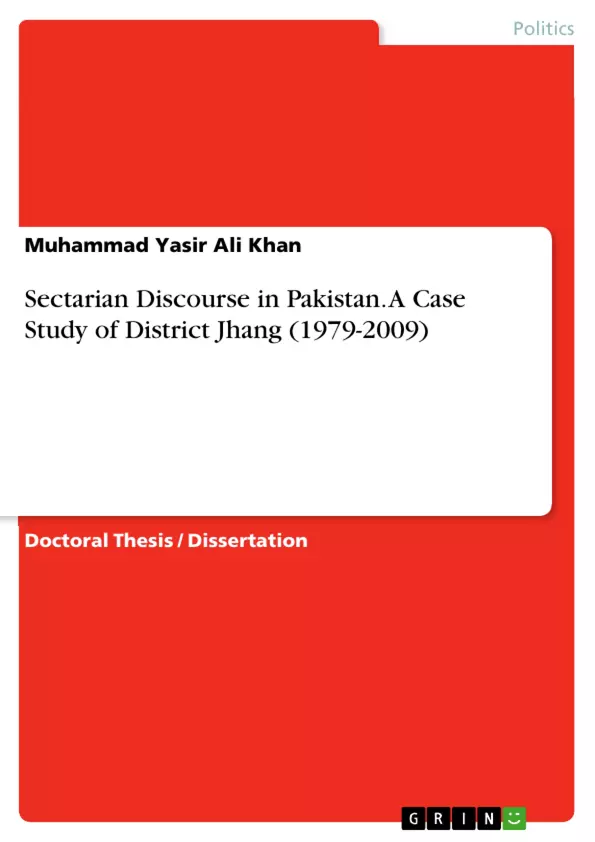
Sectarian Discourse in Pakistan. A Case Study of District Jhang (1979-2009)
Doktorarbeit / Dissertation, 2017
222 Seiten, Note: Cum laude
Leseprobe
Table of Contents
- Abstract
- Acknowledgement
Objectives and Key Themes
This study aims to understand sectarianism in Jhang, Pakistan (1979-2009) by employing cultural tools of inquiry, focusing on sectarian performances as culture-specific discursive practices. It moves beyond predominantly religious and socio-political analyses to explore the cultural roots of the phenomenon.
- Sectarian performances (textual, oral, customary)
- The role of cultural scripts in shaping sectarian identities
- The relationship between performance, audience, and the establishment of hegemonic viewpoints
- The dynamics of power and credibility within sectarian discourse
- Cultural analysis of sectarianism in Jhang, contrasting with existing historical, political, and socio-economic perspectives
Chapter Summaries
Abstract: This abstract introduces the concept of sectarianism as differences and divisions within a religious community, often leading to violence. It highlights the significant sectarian violence between Shia and Sunni Muslims in Pakistan, particularly in Jhang district, Punjab province. The study focuses on understanding this phenomenon through a cultural lens, analyzing sectarian performances as part of a broader discourse. It emphasizes the subjective and dynamic nature of credibility within this discourse, influenced by the relationship between performance and audience. The study explores textual, oral, and customary sectarian performances, aiming to uncover the cultural roots of sectarianism in Jhang, moving beyond primarily religious and socio-political explanations.
Acknowledgement: This section expresses gratitude to various professors and colleagues who provided support and guidance throughout the author's doctoral research. It highlights the contributions of supervisors, colleagues at different universities, and friends, emphasizing their roles in shaping the research and providing both academic and personal support. The acknowledgment section also includes thanks to family members for their moral and physical support.
Keywords
Sectarianism, Pakistan, Jhang, Shia-Sunni conflict, cultural performance, discourse analysis, cultural scripts, hegemonic viewpoints, religious violence, cultural roots.
Frequently Asked Questions: A Cultural Analysis of Sectarianism in Jhang, Pakistan (1979-2009)
What is the main focus of this study?
This study analyzes sectarianism in Jhang, Pakistan between 1979 and 2009, focusing on the cultural aspects and performances that contribute to the phenomenon. It goes beyond traditional religious and socio-political explanations to explore the cultural roots of Shia-Sunni conflict in the region.
What methodology does the study employ?
The study uses cultural tools of inquiry, analyzing sectarian performances (textual, oral, and customary) as culture-specific discursive practices. It examines how cultural scripts shape sectarian identities and the dynamics of power and credibility within sectarian discourse.
What are the key themes explored in the research?
Key themes include sectarian performances, the role of cultural scripts in shaping sectarian identities, the relationship between performance, audience, and the establishment of hegemonic viewpoints, the dynamics of power and credibility within sectarian discourse, and a cultural analysis contrasting with existing historical, political, and socio-economic perspectives.
What types of sectarian performances are examined?
The study examines textual, oral, and customary sectarian performances to understand how these contribute to the perpetuation of sectarianism.
What is the significance of the audience in this study?
The study emphasizes the importance of the relationship between performance and audience in shaping the dynamics of power and credibility within sectarian discourse.
How does this study differ from previous research on sectarianism in Jhang?
This study offers a unique cultural analysis of sectarianism, contrasting with primarily religious and socio-political explanations found in previous research. It focuses on the cultural performances and scripts that underpin the conflict.
What are the key takeaways or conclusions of the study (as presented in the abstract)?
The abstract highlights the significant sectarian violence between Shia and Sunni Muslims in Jhang, emphasizing the need to understand this phenomenon through a cultural lens. It emphasizes the subjective and dynamic nature of credibility within the sectarian discourse and explores the cultural roots of sectarianism, moving beyond primarily religious and socio-political explanations.
What is included in the Acknowledgements section?
The Acknowledgements section expresses gratitude to various individuals who supported the author's research, including professors, colleagues, family, and friends.
What are the keywords associated with this study?
Keywords include: Sectarianism, Pakistan, Jhang, Shia-Sunni conflict, cultural performance, discourse analysis, cultural scripts, hegemonic viewpoints, religious violence, cultural roots.
Details
- Titel
- Sectarian Discourse in Pakistan. A Case Study of District Jhang (1979-2009)
- Hochschule
- Universität Erfurt (Department of Religious Studies)
- Note
- Cum laude
- Autor
- Muhammad Yasir Ali Khan (Autor:in)
- Erscheinungsjahr
- 2017
- Seiten
- 222
- Katalognummer
- V1003706
- ISBN (eBook)
- 9783346363145
- ISBN (Buch)
- 9783346363152
- Sprache
- Englisch
- Schlagworte
- sectarian discourse pakistan case study district jhang
- Produktsicherheit
- GRIN Publishing GmbH
- Preis (Ebook)
- US$ 43,99
- Preis (Book)
- US$ 57,99
- Arbeit zitieren
- Muhammad Yasir Ali Khan (Autor:in), 2017, Sectarian Discourse in Pakistan. A Case Study of District Jhang (1979-2009), München, Page::Imprint:: GRINVerlagOHG, https://www.diplomarbeiten24.de/document/1003706
- Autor werden
- Ihre Optionen
- Vertriebskanäle
- Premium Services
- Autorenprofil
- Textarten und Formate
- Services für Verlage, Hochschulen, Unternehmen

- © GRIN Publishing GmbH.
- Alle Inhalte urheberrechtlich geschützt. Kopieren und verbreiten untersagt.
- info@grin.com
- AGB
- Open Publishing
Der GRIN Verlag hat sich seit 1998 auf die Veröffentlichung akademischer eBooks und Bücher spezialisiert. Der GRIN Verlag steht damit als erstes Unternehmen für User Generated Quality Content. Die Verlagsseiten GRIN.com, Hausarbeiten.de und Diplomarbeiten24 bieten für Hochschullehrer, Absolventen und Studenten die ideale Plattform, wissenschaftliche Texte wie Hausarbeiten, Referate, Bachelorarbeiten, Masterarbeiten, Diplomarbeiten, Dissertationen und wissenschaftliche Aufsätze einem breiten Publikum zu präsentieren.
Kostenfreie Veröffentlichung: Hausarbeit, Bachelorarbeit, Diplomarbeit, Dissertation, Masterarbeit, Interpretation oder Referat jetzt veröffentlichen!
- GRIN Verlag GmbH
-
- Nymphenburger Str. 86
- 80636
- Munich, Deutschland
- +49 89-550559-0
- +49 89-550559-10
- info@grin.com
-









